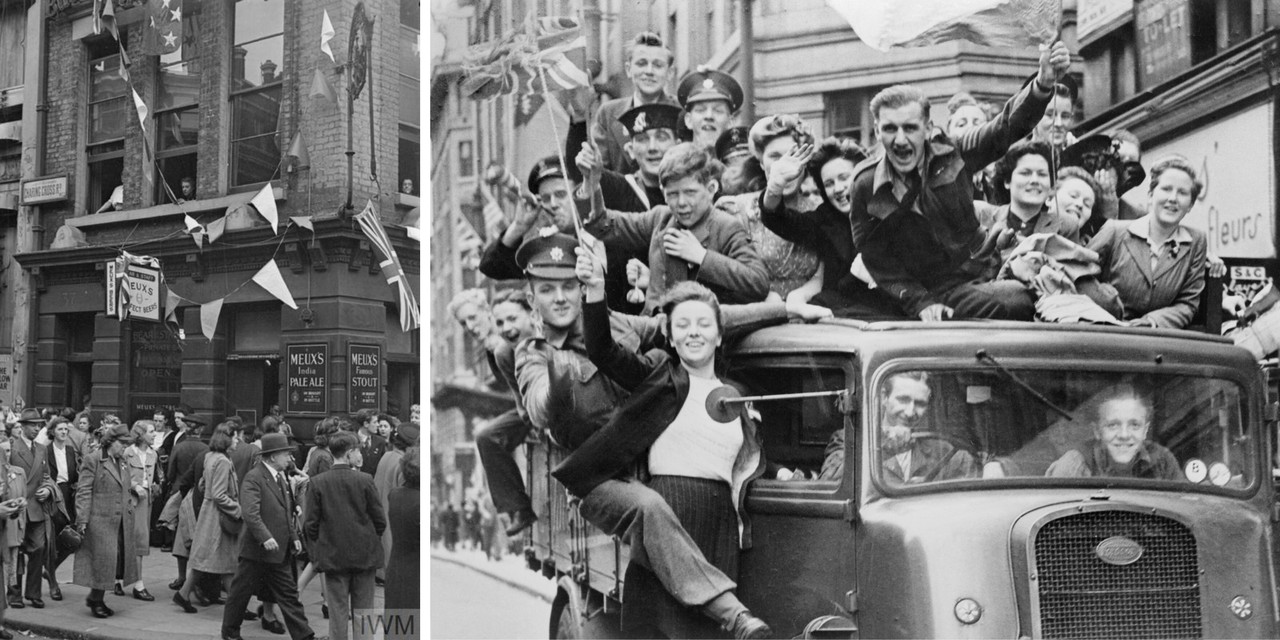While Victory in Europe Day (VE Day) is officially on May 8, 1945, the celebrations in Britain began early. The news of Germany's surrender reached British households late in the day on May 7. In response, people rushed into the streets to celebrate. How did Britain experience VE-Day?
By the spring of 1945, the end of the Second World War in Europe was within reach. With Berlin surrounded, Adolf Hitler committed suicide together with his wife in the Führerbunker on April 30th. His successor, Grand Admiral Karl Dönitz, sought to save as many German soldiers as possible from falling into Soviet hands by negotiating surrender terms with the Western Allies.
On May 4, 1945, British Field Marshal Bernard Montgomery accepted the surrender of German troops in northwest Germany, the Netherlands and Denmark. Three days later, on May 7th, Germany’s unconditional capitulation was formally signed at General Eisenhower’s headquarters in Reims (France). With that, it was official: the war in Europe was over. The document, signed by German General Alfred Jodl, wouldn’t take effect in most countries until the following day, but things were different in Britain.
The day before VE Day
On the evening of May 7, the BBC interrupted its regular programming with a news flash: Germany had officially surrendered. In the same broadcast, it was announced that the following day, May 8th, would be declared a national holiday called Victory in Europe Day.
When the news broke, the British couldn’t wait until the next day to celebrate and instead did so that very evening on May 7th, 1945. After almost six years of rationing, bombing raids and uncertainty, the chance to celebrate peace was for many irresistible.
Across the country, people flooded into the streets. In Liverpool, ten year old Joyce Hughes was woken by music and laughter: “There was a big bonfire lit at the bottom of the road, someone had pushed the piano out and everyone was on Vale Road singing and dancing. It was dark but everyone was out, fifty or more people in the street. We waited for mum and dad to come up and get us and they took us down to the bonfire. Everyone was happy, singing and hugging each other.”
That spontaneous joy was felt across the country. Street after street got decorated with flags, pubs filled up and people started dancing in the streets. Bonfires were also lit, beer was poured and strangers embraced each other.
An official day of joy
On May 8, 1945, Britain paused everything for the official Victory in Europe Day. Special victory menus and commemorative items, such as VE Day Mugs were produced overnight. Prime Minister Winston Churchill made sure there was enough beer in London and the Board of Trade allowed that red, white and blue bunting could be sold without ration coupons. VE Day could begin!
Winston Churchill addressed Britain on a radio broadcast at 3pm with a speech, urging the public to celebrate but reminding them that the war in the Pacific was still going on. Later, he appeared before cheering crowds from the balcony of the Ministry of Health. “This is your victory,” Churchill said. The crowd roared back: “No, it’s yours!” The Royal Family played a role in the celebrations too, waving to crowds from Buckingham Palace.
Joan Hall served the Women’s Royal Air Force for four years and celebrated VE Day in London. She recalled: “It was a once in a lifetime feeling of jubilation, the crowds and noise is like nothing I’ve experienced before.”
Albert Jarett, originally from Jamaica and serving the RAF, remembered the celebrations vividly as well: “I was overwhelmed at the joy and celebrations going on around me! (...)”
The celebrations went on into the night with music and dancing. Ray Smith, served aboard HMS Middleton during the war and recalls his night in London: “VE Day was truly a day of celebration! (...) We ended up going to London and joining in the celebrations right in the middle of Trafalgar Square and ended up partying all day long, meeting some lovely WRENs along the way who we ended up sleeping in a shop doorway with as there were no hotels available- but we didn’t care it had been the best day ever!”
A bittersweet day
However, not everyone joined the festivities. For many people, VE Day was a bittersweet moment. The war had left losses and extreme sadness. And while victory had come for Europe, the war in the far East and in the Pacific was far from over. Charlotte Webb joined the Artillery Territorial Service (ATS) in 1941 and said: “It was wonderful to hear the war in Europe was over, but it made no difference to my work, I was still working towards the efforts in the Far East.” The official end of the Second World War came on September 2, 1945, with the surrender of Japan.
Sources:
https://www.iwm.org.uk/history/what-you-need-to-know-about-ve-day
https://www.iwm.org.uk/history/voices-of-war/ve-day
https://www.britishlegion.org.uk/get-involved/remembrance/stories/ve-day-memories
